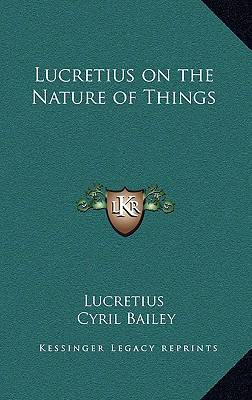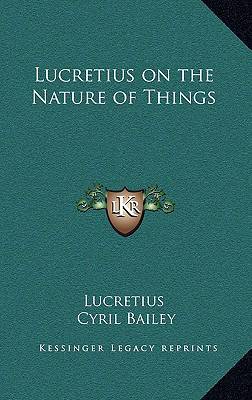
- Retrait gratuit dans votre magasin Club
- 7.000.000 titres dans notre catalogue
- Payer en toute sécurité
- Toujours un magasin près de chez vous
- Retrait gratuit dans votre magasin Club
- 7.000.000 titres dans notre catalogue
- Payer en toute sécurité
- Toujours un magasin près de chez vous
Description
Lucretius on the Nature of Things is a philosophical text written by the Roman poet and philosopher, Lucretius. It is a poetic and scientific exposition of Epicurean philosophy, which advocates for the pursuit of pleasure and the avoidance of pain as the ultimate goal of human life. The book explores various topics such as the nature of the universe, the existence of gods, the mortality of the soul, and the principles of atomism. Lucretius argues that the universe is made up of tiny, indivisible particles called atoms, which move and combine to form all matter. He also challenges the traditional belief in the gods and the afterlife, arguing that they are simply human projections and that death is the end of consciousness. The book is written in a poetic and accessible style, making it a popular work of philosophy in the ancient world and beyond.1926. Lucretius was a Roman poet and the author of the philosophical epic De Rerum Natura (On the Nature of the Universe), a comprehensive exposition of the Epicurean world-view. His poetry is knit into a whole and vivified through all its parts by the fearless desire for truth, the consciousness of a great purpose, and a deep reverence for nature-felt almost as a personal presence-which has caused this bitter opponent of religion to be universally recognized as one of the most truly religious of the world�������s poets.This scarce antiquarian book is a facsimile reprint of the old original and may contain some imperfections such as library marks and notations. Because we believe this work is culturally important, we have made it available as part of our commitment for protecting, preserving, and promoting the world's literature in affordable, high quality, modern editions, that are true to their original work.
Spécifications
Parties prenantes
- Auteur(s) :
- Editeur:
Contenu
- Nombre de pages :
- 316
- Langue:
- Anglais
Caractéristiques
- EAN:
- 9781163329573
- Date de parution :
- 10-09-10
- Format:
- Livre relié
- Format numérique:
- Genaaid
- Dimensions :
- 152 mm x 229 mm
- Poids :
- 635 g







